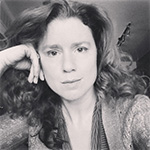Digital Humanities Librarian – Rutgers University
 Please tell us a bit about yourself (e.g. hometown, current locale, course of study).
Please tell us a bit about yourself (e.g. hometown, current locale, course of study).
I am originally from Cleveland Heights, Ohio, although I now reside in New Brunswick, New Jersey, about 15 minutes away on foot from the Rutgers-New Brunswick campus. I’ve moved around a lot for education and work, so in between those two cities are l’Aigle, Nantes and Paris, France, where I eventually got a vocal performance degree, Boston, Massachusetts, where I worked in corporate and foundation development, and Austin, Texas, where I got my library degree.
Describe some of your current responsibilities, and what type of organization you belong to.
I am the Digital Humanities Librarian at Rutgers-New Brunswick, where I am also the subject liaison for the departments of Comparative Literature, French and Italian. In this regard, I am an atypical SSP member, but I am also somewhat unusual in the academic library world, being split between a traditional collections-centric role and a newer one focused on digital publishing, computational methods, instruction and consultation.
What was your first scholarly publishing role? How did you get that job? What path led to your current position?
I am currently in it! As for how I got here, I’ll cite one of my favorite books, James Branch Cabell’s Jurgen: “Roundabout… There is never any other way.” I actually went to library school expecting to become a music librarian, and while I did interview for several such positions, the first offer I received came from Rutgers to become their first Digital Humanities Librarian on the New Brunswick campus. Fortunately, while at the UT Austin iSchool, I did drink the digital Kool-Aid and took several fantastic courses in DH, digital libraries, and database management, which allowed me to argue my suitability for library jobs that involved some component of digital publishing and scholarly communication. And miraculously, my current role allows me to tie together my interests in Romance languages and literature, digital media and culture, computational methods, musicology and digital sound studies.
If there was a pivotal moment or key person in your career development, please describe briefly.
There were several, but I’d like to mention specifically October Ivins (SSP member and Co-Chair of the Organizational Collaboration Committee), who has been a wonderful mentor to me. A mutual friend connected us at a delicate moment when I was contemplating a career change from non-profit fundraising to librarianship. I was in my mid-thirties and wondering if it was already too late, and if the precarious field of librarianship would even have room for me. She had many wise and hard truths to share (e.g. “in two years, you’re going to be 37 anyway, whether you get the degree or not”). She has also introduced me to many of her industry colleagues and encouraged me early to attend conferences and to think about presenting and publishing my work.
What tools, web sites and organizations do you find most valuable for your career development?
For career development, my toolkit mostly relies on Twitter and an RSS reader (Feedly) that I use to keep track of dozens of professional blogs and listservs. Twitter has really been the most surprising gift economy. Not only can I follow the feeds of conferences I can’t attend, learn about the research of professionals located all over the globe, and ask obscure questions of the Twitterverse, but most wonderfully people will tweet me unbidden about work that is relevant to my areas of research.
What are some of the surprises/obstacles that you’ve encountered during your career?
My career has relied on a combination of luck and preparedness, and I think that is fairly common. I try to be the best human and professional I can be, but oftentimes it comes down to having an experience or meeting a person at the right time. This means that occasionally there are prolonged intellectual and spiritual droughts, in which nothing seems to go well, and I’ve had them. The only wisdom I have to offer in such circumstances is to resist the urge to retrench.
What do you wish you knew more about?
Everything. But to give an example, I wish I knew more about manipulating XML data with XSLT, XPath and Xquery.
What advice would you give to people interested in a career in scholarly communications?
Keep diversifying your skills to the extent that you can. Not only do careers evolve more quickly these days, but it seems that nobody has the desired margins or levels of staffing. It’s a job climate that rewards agility and the willingness to take on a leadership role. But I’d also like to add that there’s room for all personality types. As an introvert, I think we sometimes fancy we are at a professional disadvantage, but my experience is that being authentic to who you are is a precondition for happiness, and that leadership comes in all different kinds.

